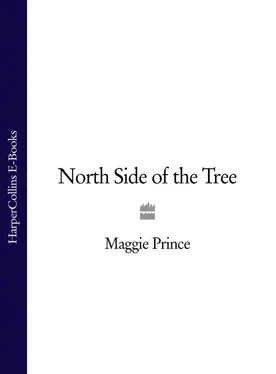North Side of the Tree
MAGGIE PRINCE
For Chris, always
In transposing Beatrice’s story into modern English,the tone and content of her original narrativehave been preserved throughout,and her exact words wherever possible.
It is the late 1500s. Queen Elizabeth I is on the throne of England…
Cover
Title Page
Dedication
Map
Epigraph
Chapter 1
Chapter 2
Chapter 3
Chapter 4
Chapter 5
Chapter 6
Chapter 7
Chapter 8
Chapter 9
Chapter 10
Chapter 11
Chapter 12
Chapter 13
Chapter 14
Chapter 15
Chapter 16
Chapter 17
Chapter 18
Chapter 19
Chapter 20
Chapter 21
Chapter 22
Chapter 23
Chapter 24
Chapter 25
Chapter 26
Chapter 27
Chapter 28
Chapter 29
Chapter 30
Chapter 31
Chapter 32
Chapter 33
Chapter 34
Keep Reading
Glossary
Acknowledgements
Praise For Raider’s Tide
Also by Maggie Prince
Copyright
About the Publisher
I walk the Old Corpse Road again. In the dawn light the woods are full of birdsong and the waking voices of sheep. Around me, oak and hazel trees are turning to red and gold and ruin.
I am on my way to visit my sister who is living at Wraithwaite Parsonage in order to avoid being killed by my father. I move carefully amongst the trees, because this is the way he may be coming home, tired and edgy from a night’s robbery on The King’s Strete, some miles to the east of us.
I do not wish to meet my father, but I am not in a position to criticise him, because I too have a secret. I am a traitor. Three people know it, and their silence is all that stands between me and being burnt at the stake.
I reach the rockface that makes the Old Corpse Road such a quick but difficult short-cut to our neighbouring village, and climb the steps cut into it, breathing in the earthy smells of autumn. Stunted yews and clumps of heather grow out of clefts in the limestone, and I hold on to them to haul myself up. At the top I nearly collapse with fright. Two strange men are asleep amongst the roots of a beech tree, perilously close to the edge of the escarpment. They have swords and axes at their sides. I tiptoe past them. These must be some of the men who walked from all over the district to march on Scotland with my father. Last spring we were raided by Scots, as we often are in this part of the country. Our men were to have raided them back, but this has now been put off until next spring, since our enemies have been forewarned by a fugitive Scot who hid for months in a hermit’s cottage in the woods, and discovered our plans.
Oh Robert, where are you now? Are you safe? You may be gone from here, but I wish very much that you could be gone from my mind too.
As I set off through the thinning trees, on to the heathland which surrounds Wraithwaite, I glance back at the two men and silently wish them well. I’m glad this raid has been abandoned, and that they do not have to go to war. Maybe the raid on Scotland will be forgotten altogether now. With Robert gone, and all the preparations for winter needing to be made, anti-Scottish feeling along the border is dying down.
I pass the first cottages along the track to Wraithwaite. A woman is hanging out her washing. We call, “Good morrow, mistress,” to each other, and she glances at the sky and adds, “I’m tempting fate. It’s going to rain.”
A flurry of wind blows the fallen leaves into a spiral ahead of me, and I nod in agreement. “You’re right, mistress.”
Sometimes, relief just washes over me. Little exchanges like this feel such a luxury, after being on the wrong side of the law for so long. I can pretend to be a respectable member of the community again, working the family farm, preparing to become betrothed to Cousin Hugh. Robert is gone. He wasn’t caught, and neither was I. My narrow escape makes me want to be very, very good indeed, even to the extent of marrying Hugh, my childhood playmate, as is expected of me, no matter how ludicrous it might feel.
The parsonage stands on the far side of Wraithwaite Green. It is a beautiful stone house, but in poor repair. There is worm in its doorposts, and its roof slates are pushed out of kilter by tuffets of bright green moss. John Becker, our young and beautiful parson, was my teacher until I turned sixteen earlier this year. He knows my secret. He also saved me from drowning a month back. The warmth which once developed between us during long afternoons in a drowsy classroom has many a time teetered on the verge of becoming something more. I daren’t look too closely at my feelings for John Becker, if I am indeed to redeem myself by marrying Hugh.
I walk up to the front of the house. Over the door, carved into the lintel, are the words Truth and grace be to this place. I can hear someone chopping wood behind the house, so when no one answers my knock, I walk round to the back. John is chopping logs. He is shirtless and in coarse woven breeches and leather jerkin. He looks most unlike a priest. He hasn’t seen me. I pull my cloak tightly round me and watch him swinging the axe at log after log, splitting them with the grace of long practice. The back of his neck is running with sweat. His dark curls look chaotic and unkempt.
I say softly, “Hello John…” and he turns. He is not an easy person to catch unawares, but I do so then. He stares at me for a moment, then secures the axe with a gentle chop into a new log, and comes over to me. I start to say, “Verity sent word that she wants to see me…” but the words dry in my throat as John Becker holds me by the shoulders and kisses me full on the lips. I feel a shock of such proportions that for a moment I scarcely know where I am. I look up at him. Next to us in the stables his black horse, Universe, stamps and snorts.
John says, “I refuse to go on pretending. I know it’s probably too soon after your Scot, Beatie, but…”
There are footsteps behind me, and someone whistling. I turn. It is my sister, Verity.
“Beatie!” She comes out of the house and hugs me, then glances curiously from one to the other of us. “Well, I do declare,” she murmurs.
Universe is now trying to kick the stable door down. John unbars the top half of it. “I’d better let him out into the meadow. You two go in.” He smiles at Verity. “You have matters to discuss, I think. I’ll join you later.”
My sister has been here for many weeks now, after angering my father by her desire to marry not her Cousin Gerald, as the family decreed, but James Sorrell, a young neighbouring farmer. James also had to take refuge here from my father’s wrath for a while, but is now back tending his own farm, protected by two sturdy bodyguards, George and Martinus. They were once my father’s henchmen before they too angered him and were sent away. Many people anger my father. Most end up elsewhere.
I go into the kitchen to greet Mother Bain, John’s deaf, elderly housekeeper, then follow Verity up the narrow wooden stairs and along the landing to her room. The parsonage is in even worse fettle inside than out. The beams over our heads are crumbling to dust in places, and the door is so warped that it gapes against its frame when I shut it behind me. Verity’s bed, though, is beautiful: pale old oak carved with scrolls and animals, and hung about with fine grey velvet curtains. She climbs up against the heap of bolsters at the head of the bed, and I sit on the end. The feather mattress shifts comfortably to the shape of my legs. Verity is still in her nightsmock, a vast linen article of smothering decency. Her day clothes lie on a cedar chest by the wall. “Don’t you want to get dressed?” I ask her.
Читать дальше












